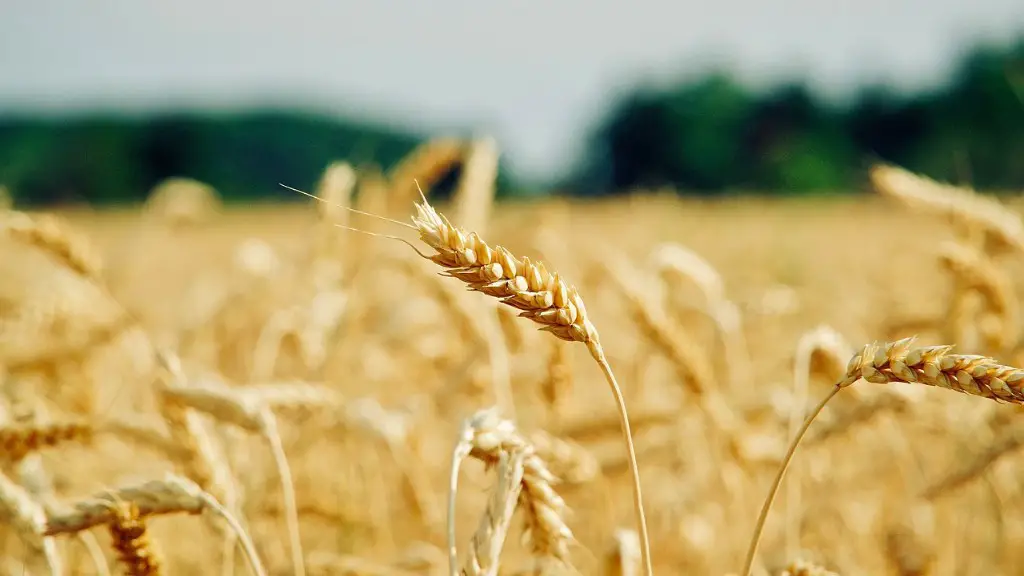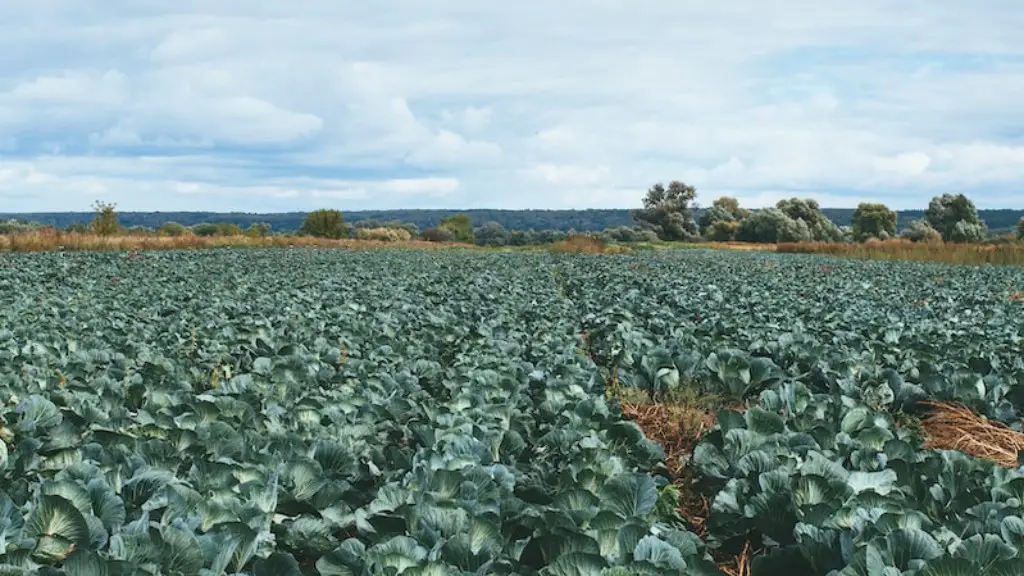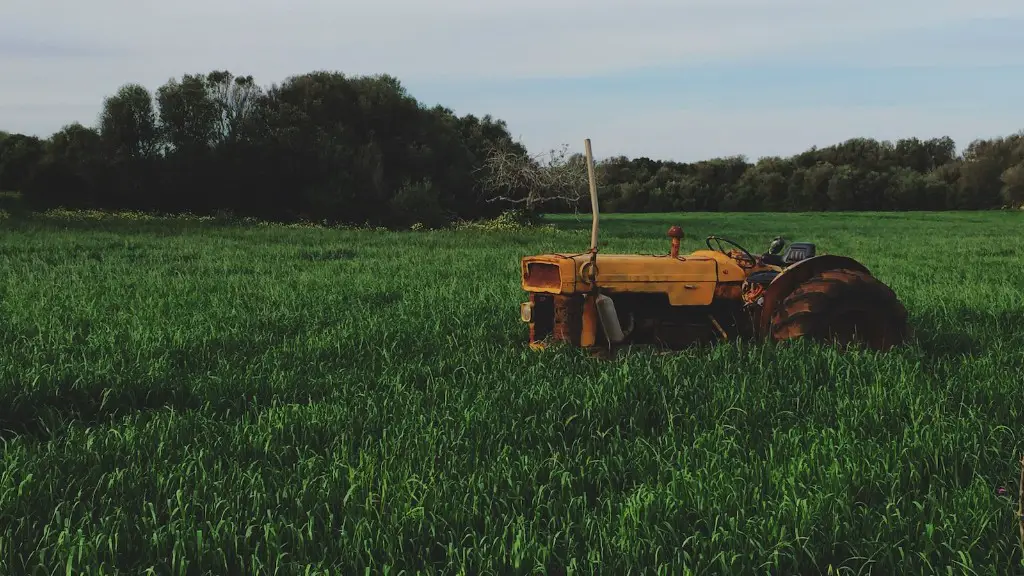Non-renewable resources are critical to the success and sustainability of modern agricultural practices. Without the availability of combustible and extractable resources like oil, gas, and minerals, it would be difficult for farmers to effectively manage their crops and livestock. Non-renewable resources provide the power for farm machinery, as well as providing sources of energy for water pumps and irrigation systems. Non-renewable resources are also vital to fertilizer production, and the transportation of goods from the farm to the market or processing plant.
In addition, non-renewable resources are widely used in agricultural manufacturing. Chemicals and petrochemicals derived from petrochemical sources are used in insecticides, fertilizers, and animal feed production. Furthermore, the creation of agricultural bioproducts and new methods of food preservation relies on these resources. Without the availability of these key non-renewable resources, many of the advances made in agricultural production would not be possible.
Non-renewable resources are also invaluable to the success of agricultural research, providing vital ingredients and technological infrastructure. For instance, fuels, lubricants, and cooling technologies are necessary for specific agricultural processes. Furthermore, the availability of these resources allow researchers to conduct experiments in a wide variety of environments in order to develop new techniques, methods, and technologies.
Industrial agriculture is perhaps the most significant user of non-renewable resources, from the production of farm machinery, to the creation of fertilizers and pesticides. As the global population continues to rise, so does the demand for farm produce to feed it. Industrial agriculture enables this to happen relatively quickly, thanks to the non-renewable resources available and the technology which keeps advancing.
The final reason non-renewable resources are so important to agricultural practices is that they are among the least expensive sources of energy available. Non-renewable resources also generate electricity more efficiently than other available sources. As a result, their widespread availability helps to keep overall agricultural costs down and allows farmers to manage their other costs more efficiently.
Fossil fuels
Fossil fuels are the primary sources of non-renewable energy for agricultural operations. Oil and gas are the most widely used energy sources since they are relatively inexpensive and quite abundant. Oil and gas are extensively used for farm machinery and vehicles, as well as for powering irrigation, cooling systems, and other technologies associated with agricultural production.
The use of fossil fuels in agriculture consequently has an impact on soil fertility and water quality. Burning fossil fuels releases greenhouse gases that contribute to global warming, while chemicals used in their extraction can pollute the soil, air, and water. As such, farmers must use good agricultural practices, like the use of efficient fertilizers, and seek out renewable sources of energy, such as solar and wind, in order to reduce the negative environmental impacts of their use.
Petrochemicals
Petrochemicals are highly useful to farmers and agricultural production. They are used in the manufacture of fertilizers and pesticides, and are also integral to the development of food preservation technologies. They are likewise used for the production of plastics, rubber, and other consumer items associated with farming and agriculture. In order for such products to reach the consumer in a timely fashion, the use of petrochemicals is necessary.
The manufacture of petrochemicals is a costly process and can also have an adverse environmental impact. Many of the chemicals used in their production are hazardous and present a threat to humans and the environment. As such, when using petrochemicals for agricultural processes, farmers must exercise caution and use good safety techniques.
Minerals
Minerals are also essential non-renewable resources used in agriculture. Iron, aluminum, and zinc are three minerals that help to increase crop yield, while calcium helps to improve nutrient uptake in the soil. Mineral extraction often causes environmental damage, due to the acid runoff and sediment discharge produced in the extraction process, so farmers must use best practices when sourcing and utilizing minerals.
Minerals are necessary for the mechanization of agricultural processes, such as planting, tilling, harvesting, and raking. The use of minerals also helps to improve soil fertility, and provides a variety of trace elements that are beneficial to crops, as well as some animals. The use of mineral supplements in animal feed also helps to improve the digestibility of feed, resulting in better animal nutrition, health, and performance.
Nonrenewable energy sources
Nonrenewable energy sources, such as coal, natural gas, and oil, are also used in agricultural settings. These resources provide electricity for irrigation, farm machinery, and even shelters for farm animals. Their use is especially pertinent in areas that lack access to renewable sources of energy, making them essential to the success and sustainability of modern agricultural operations.
The use of these energy sources can be very costly, and also produces greenhouse gases which contribute to global warming. As such, farmers and agricultural experts are always looking for more efficient ways to use these resources. For example, they may invest in new technologies, such as renewable energy sources, in order to reduce their overall energy costs and minimize their environmental impact.
Advances in technology
Finally, the use of nonrenewable resources has enabled advances in technology that have changed the way farmers manage their operations. New farm automation technologies allow for increased safety, precision, and efficiency of agricultural processes. Computerized farm equipment, as well as remotely operated drones and tractors have revolutionized the way crops are planted, watered, and harvested.
Moreover, advances in technology have enabled farmers to make use of robotics and artificial intelligence to enhance their operations.This includes the use of sophisticated sensors and algorithms to detect soil health, monitor the health of livestock, and even reduce the environmental impact of agricultural activities. Such technology is vital to the success and sustainability of modern agricultural production.



